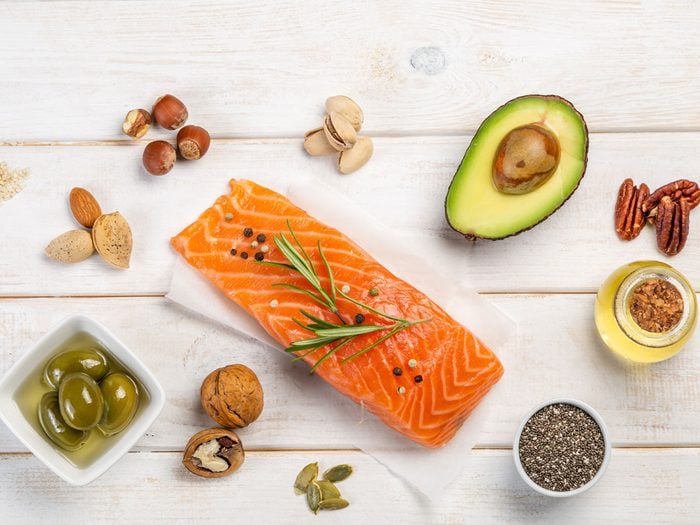
Sabotaging your weight loss?
Remember Bridget Jones, the poster girl for yo-yo dieting? In one year, the literary heroine lost 75-pounds and gained 78. Sure, Jones isn’t real, but her situation is: according to Statistics Canada, two-thirds of Canadians who lose weight go on to gain at least some of it back. Want to stop sabotaging your weight loss? Read on to see if any of these surprisingly simple pound-shedding deal breakers apply to you.

#1: You’re not getting enough fluids
If you’re dehydrated, your body might retain water to compensate, which can result in weight gain and puffiness. Water helps flush out impurities and can also keep hunger at bay. Plus, it assists the body in metabolizing fat. Not a water fan? “Focus on getting as much hydration as you can from caffeine-free herbal teas or watered down juice,” says Joey Shulman, a registered nutritionist. Go easy on commercial beverages that claim to have wellness-boosting properties, though, because they might be loaded with sugar and sodium. And make it a habit to start paying attention to these 17 signs you’re dehydrated.

#2: You’re not eating often enough
“Skipping meals can have a negative impact on your metabolism,” says Toronto nutritionist Aviva Allen. Your body might start storing extra fat in anticipation of more missed meals. Instead of eating less, consume small, nutrient-dense snacks and meals more often — every three hours is ideal — and try not to eat after seven o’clock at night, when your metabolism is at its slowest.
Eating often also makes it easier to stay on track because denying yourself food isn’t a sustainable practice. “The biggest mistake is to think of your diet as a temporary event to reach a specific weight-loss goal,” says Allen. “If you plan to return to your old habits once you’ve reached your goal, the weight will quickly return.”

#3: You’re not sleeping enough
Didn’t think getting enough rest had anything to do with sabotaging your weight loss? Think again. “Not only are seven to nine hours of sleep necessary for rejuvenating your body and maintaining a healthy mind, but there is also research that suggests links between sleep and weight control,” says Kathryn Nobrega-Porter, a doctor of naturopathic medicine at the Wellpath Clinic in Toronto. “The hormones leptin and ghrelin both influence your appetite, and the production of them may be influenced by how much or how little you sleep.”
According to Nobrega-Porter, leptin is a mediator of energy balance and it can suppress the appetite, which means it can also help with weight loss. Meanwhile, ghrelin is a fast-acting hormone that plays a role in the feeling of hunger. “With adequate sleep, these two hormones are kept in balance and can help regulate appetite control,” she says.
If you’re still struggling to catch enough shut-eye, one or more of these sleep stealers may be to blame.

#4: You’re not writing it down
Perhaps the only thing Bridget Jones did right was keeping track of her food intake, but it didn’t seem to teach her any lessons about weight loss! In reality, studies suggest keeping a food diary has a positive impact on diet success. “Keeping a food journal keeps you conscious and keeps you honest,” says Shulman. “If you know you have to be accountable, you might do less emotional eating.”
You don’t have to keep of log of everything you consume for the rest of your life, however. “You should log your foods initially until you find your rhythm,” says Nobrega-Porter. The idea is that if you give it enough thought, healthy, conscious eating will become a way of life.
Put an end to sabotaging your weight loss for good and learn how to take control of your emotional eating habits.

#5: You don’t have support
Losing weight — even just five or 10 pounds — takes true commitment, so it’s no surprise that people who have support from friends or family tend to experience more success with healthy eating and fitness regimes. “Share your goals with friends and family who you think will be supportive of your plan,” says Nobrega-Porter. “Let them know your biggest challenges so they can be there for times when you need motivation and positive words of encouragement.”

#6: You don’t have a plan
Life is full of variables that can thwart your weight loss goals. Don’t try to abstain from your favourite foods — you’re only human, after all. “You need to plan your holiday cheats,” says Shulman. “If you have no plan, [your diet] will go out the window.” She suggests eating a wholesome snack, such as a hardboiled egg, before heading to a holiday party. Then choose your “gimme food” — something you know you can’t live without — and plan to indulge in that while cutting back on other things you care about less.

#7: You’re not reading food labels correctly
Reading labels is about more than simply looking for food items that claim to be diet friendly. “Just because it’s low in fat doesn’t mean it’s low in sugar,” says Shulman, “and too much sugar will knock you out of insulin balance, which can trigger weight gain.”
Food additives can also cause the digestive system to become sluggish, so Allen recommends cutting out processed foods altogether when trying to lose weight. “By removing processed foods from the diet and replacing them with nutritious alternatives — whole foods like fruits, vegetables, whole grains, beans, nuts and seeds, fish, organic poultry, and eggs — weight can come off.” Take our test to find out your nutritional IQ.

#8: You’re a yo-yo dieter
Fad diets, diets that require you to purchase special food and plans that require you to cut out certain food groups altogether often end up with you right back where you started on the scale. “Stop yo-yo dieting, because eventually, your metabolism will conk out from all the up and down and it will be harder to lose weight,” says Shulman. Instead, choose a diet program that works for your lifestyle and work the best parts of it into your routine — even after you’ve lost the weight. Read up on what Jillian Michaels really thinks of today’s hottest diet and fitness trends.

#9: You’re not active enough
Although you can lose weight just by cutting down on calories, it’s more likely that you’ll keep the weight off if you engage in some form of physical activity. “Incorporating regular activity is a guaranteed way to burn extra calories,” says Nobrega-Porter. “If you’re still in the process of finding out what activity you like to do, try to start by walking. Making sure to move 30 minutes most days is important to help achieve and sustain your goals.” Here’s what a single workout can do for your metabolism.

#10: You’re mixing the wrong foods
Cutting out food groups means you might be missing out on nutrients you need to lose weight and stay healthy. “Avoid cutting out important food groups such as carbohydrates, for example,” says Allen. “Complex carbohydrates such as whole grains, legumes, and vegetables are important sources of fibre, which is essential for keeping us regular and removing excess cholesterol, fat, and toxins from our bodies.”
Rather than avoiding fats, try to form a healthy relationship with them. “That low-fat nonsense doesn’t work,” says Shulman. “You need monounsaturated essential fatty acids, like nuts, seed, fish oil, fish, olive oil, avocadoes, and olives.”
Tired of sabotaging your weight loss? Check out 15 weight-loss mistakes nearly everyone makes.
